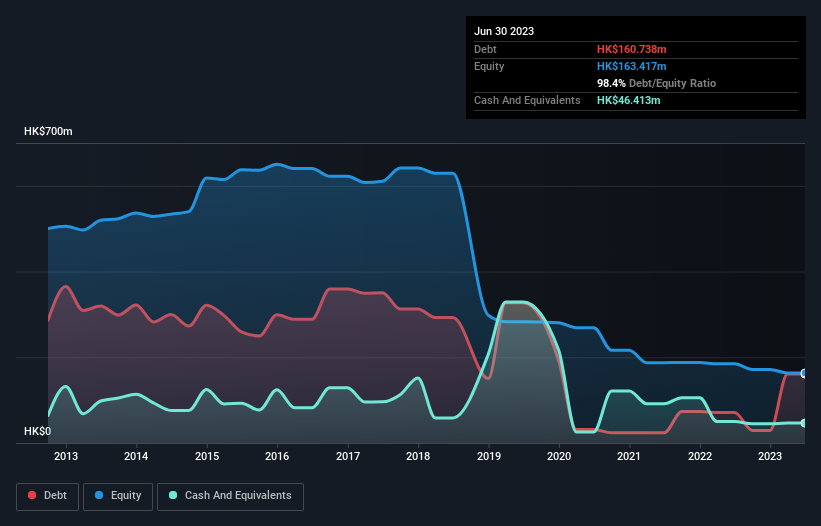- Hong Kong
- /
- Healthcare Services
- /
- SEHK:1298
We Think Yunnan Energy International (HKG:1298) Has A Fair Chunk Of Debt

Some say volatility, rather than debt, is the best way to think about risk as an investor, but Warren Buffett famously said that 'Volatility is far from synonymous with risk.' It's only natural to consider a company's balance sheet when you examine how risky it is, since debt is often involved when a business collapses. We can see that Yunnan Energy International Co. Limited (HKG:1298) does use debt in its business. But the more important question is: how much risk is that debt creating?
Why Does Debt Bring Risk?
Generally speaking, debt only becomes a real problem when a company can't easily pay it off, either by raising capital or with its own cash flow. If things get really bad, the lenders can take control of the business. However, a more frequent (but still costly) occurrence is where a company must issue shares at bargain-basement prices, permanently diluting shareholders, just to shore up its balance sheet. By replacing dilution, though, debt can be an extremely good tool for businesses that need capital to invest in growth at high rates of return. The first step when considering a company's debt levels is to consider its cash and debt together.
Check out our latest analysis for Yunnan Energy International
What Is Yunnan Energy International's Net Debt?
The image below, which you can click on for greater detail, shows that at June 2023 Yunnan Energy International had debt of HK$160.7m, up from HK$71.1m in one year. However, because it has a cash reserve of HK$46.4m, its net debt is less, at about HK$114.3m.

How Healthy Is Yunnan Energy International's Balance Sheet?
Zooming in on the latest balance sheet data, we can see that Yunnan Energy International had liabilities of HK$203.8m due within 12 months and no liabilities due beyond that. Offsetting these obligations, it had cash of HK$46.4m as well as receivables valued at HK$77.1m due within 12 months. So its liabilities total HK$80.4m more than the combination of its cash and short-term receivables.
While this might seem like a lot, it is not so bad since Yunnan Energy International has a market capitalization of HK$176.3m, and so it could probably strengthen its balance sheet by raising capital if it needed to. But we definitely want to keep our eyes open to indications that its debt is bringing too much risk. When analysing debt levels, the balance sheet is the obvious place to start. But it is Yunnan Energy International's earnings that will influence how the balance sheet holds up in the future. So if you're keen to discover more about its earnings, it might be worth checking out this graph of its long term earnings trend.
In the last year Yunnan Energy International wasn't profitable at an EBIT level, but managed to grow its revenue by 59%, to HK$282m. With any luck the company will be able to grow its way to profitability.
Caveat Emptor
Even though Yunnan Energy International managed to grow its top line quite deftly, the cold hard truth is that it is losing money on the EBIT line. To be specific the EBIT loss came in at HK$5.7m. Considering that alongside the liabilities mentioned above does not give us much confidence that company should be using so much debt. So we think its balance sheet is a little strained, though not beyond repair. Another cause for caution is that is bled HK$7.6m in negative free cash flow over the last twelve months. So to be blunt we think it is risky. When analysing debt levels, the balance sheet is the obvious place to start. But ultimately, every company can contain risks that exist outside of the balance sheet. For instance, we've identified 4 warning signs for Yunnan Energy International (3 are concerning) you should be aware of.
When all is said and done, sometimes its easier to focus on companies that don't even need debt. Readers can access a list of growth stocks with zero net debt 100% free, right now.
New: Manage All Your Stock Portfolios in One Place
We've created the ultimate portfolio companion for stock investors, and it's free.
• Connect an unlimited number of Portfolios and see your total in one currency
• Be alerted to new Warning Signs or Risks via email or mobile
• Track the Fair Value of your stocks
Have feedback on this article? Concerned about the content? Get in touch with us directly. Alternatively, email editorial-team (at) simplywallst.com.
This article by Simply Wall St is general in nature. We provide commentary based on historical data and analyst forecasts only using an unbiased methodology and our articles are not intended to be financial advice. It does not constitute a recommendation to buy or sell any stock, and does not take account of your objectives, or your financial situation. We aim to bring you long-term focused analysis driven by fundamental data. Note that our analysis may not factor in the latest price-sensitive company announcements or qualitative material. Simply Wall St has no position in any stocks mentioned.
About SEHK:1298
Yunnan Energy International
An investment holding company, distributes analytical and laboratory instruments, and life science equipment in the People’s Republic of China, rest of Asia, and internationally.
Mediocre balance sheet low.
Market Insights
Community Narratives




